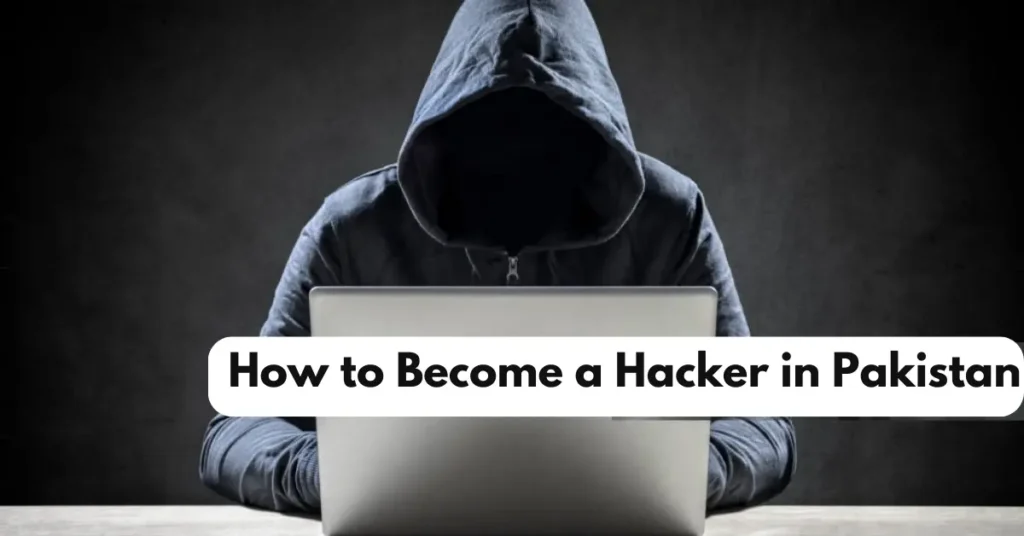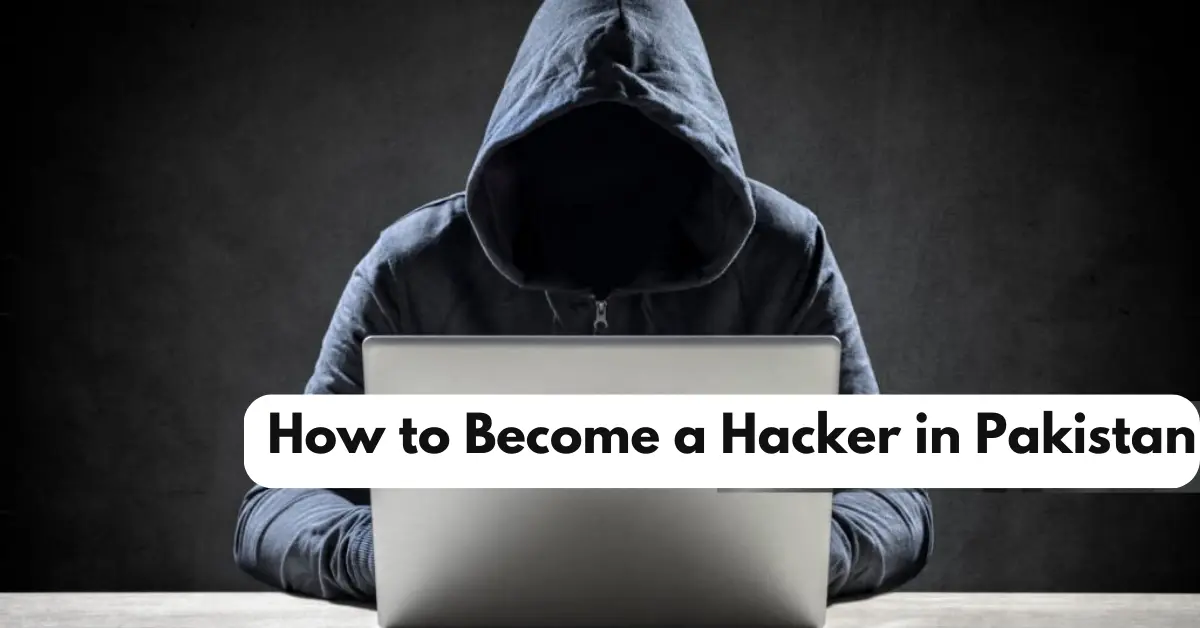Welcome to the gateway of ethical hacking in Pakistan! In this comprehensive guide, discover the roadmap to becoming an ethical hacker, exploring the dynamic world of cybersecurity and hacking ethics.

Uncover the essentials, from foundational knowledge to the allure of this career path, and embark on a journey where digital curiosity meets ethical responsibility. Join us as we unravel the secrets of this intriguing domain and pave the way to a fulfilling career in cybersecurity.
Steps to Become an Ethical Hacker
Becoming an ethical hacker requires a structured approach and a diverse skill set. Here’s a breakdown of essential steps to guide you on this transformative journey:
#1: Building Foundation Skills
To start, immerse yourself in foundational knowledge. Familiarize yourself with operating systems like Linux/Unix, as they form the backbone of hacking tools and techniques. Understanding their architecture, commands, and functionalities lays a sturdy groundwork.
#2: Exploring Advanced Concepts
Dive deeper into programming languages, especially Python—a versatile language pivotal in hacking. Mastering Python not only empowers you to write efficient scripts but also unlocks capabilities in automation and tool development, fundamental in ethical hacking.
#3: Networking and Learning from Experts
Acquire a profound understanding of networking concepts. Grasp protocols, network layers, and security measures to comprehend system vulnerabilities. Engage in communities, attend workshops, and learn from seasoned professionals to gain insights and real-world experiences.
#4: Addition of Secret Writing to Your Skill Set
Encryption and decryption techniques are vital. Learn cryptography and steganography, the art of hiding information within other data, to secure communications and uncover hidden messages—an invaluable asset in ethical hacking.
#5: Delve Deeper into Hacking
Progress to more advanced hacking methodologies. Understand reconnaissance, scanning, and exploitation techniques. Practice ethical hacking in controlled environments to comprehend vulnerabilities and devise strategies for defense.
#6: Explore Vulnerabilities
Familiarize yourself with common vulnerabilities—SQL injection, cross-site scripting, and more. Recognizing these weaknesses helps anticipate potential threats and strengthens security measures.
#7: Experiment and Practice with Ace Hacking
Practice is key. Engage in ethical hacking challenges, capture the flag (CTF) competitions, and simulated environments to sharpen your skills. Continual experimentation and problem-solving enhance your proficiency.
#8: Attend Discussions and Meet Expert Hackers
Engaging in discussions, forums, and networking events within the cybersecurity community exposes you to diverse perspectives and expertise. Interacting with industry experts provides invaluable insights and mentorship opportunities.
Following these steps lays the groundwork for an aspiring ethical hacker. Each step is pivotal, contributing to a well-rounded skill set and mindset necessary to navigate the ethical hacking landscape with confidence and responsibility.
Get more information: How to Become a Good Teacher in Pakistan: Do not Miss to Read
The Journey of an Ethical Hacker
Embarking on a career as an ethical hacker encompasses various stages, each marking significant growth and expertise acquisition:
Career Progression
- Starting: Begin with foundational knowledge acquisition, including understanding basic concepts, tools, and methodologies.
- Network Support: Transition into roles involving network troubleshooting and support, gaining hands-on experience.
- Network Engineer: Progress into engineering roles, designing and implementing network solutions while delving deeper into security protocols.
- Information Security Work: Advance to specialized roles within information security, where you actively engage in securing systems and networks.
Roles and Specializations
- As an ethical hacker, you may find diverse roles such as penetration tester, security analyst, or ethical hacking consultant.
- Penetration testers simulate cyber attacks to evaluate system security, while security analysts monitor and respond to security incidents.
- Ethical hacking consultants offer expertise to organizations, devising strategies to fortify digital defenses.
Understanding these career stages aids in setting realistic expectations and defining your professional trajectory as an ethical hacker. Each phase contributes uniquely to your skill set and experience, paving the way for a fulfilling and impactful career in cybersecurity.
Tools and Skills for Ethical Hackers
A successful ethical hacker relies on a combination of tools and skills to navigate the complex landscape of cybersecurity. Here’s an exploration of essential components:
Essential Toolkits
- Nmap: A versatile network scanning tool for reconnaissance, and discovering hosts, services, and vulnerabilities.
- Metasploit: A robust framework aiding in developing, testing, and executing exploit code.
- Wireshark: A powerful network protocol analyzer facilitating in-depth inspection of network traffic.
- Burp Suite: A comprehensive web application testing tool for identifying and exploiting security vulnerabilities.
- John the Ripper: A potent password-cracking tool used to uncover weak passwords.
Developing Necessary Skills
- Programming: Proficiency in languages like Python, Bash scripting, and PowerShell enables the creation of custom tools and automating tasks.
- Networking Knowledge: Understanding network protocols (TCP/IP, DNS, HTTP) and concepts (firewalls, VPNs) are critical for analyzing and exploiting vulnerabilities.
- Cryptography and Encryption: Mastery of cryptographic techniques aids in securing communications and decrypting encoded data.
- Problem-Solving and Critical Thinking: Ethical hackers must possess sharp analytical skills to identify and mitigate security risks effectively.
Continuous Learning and Adaptation
- Technology evolves rapidly, necessitating constant learning and adaptation to new tools and techniques.
- Engage in hands-on practice, participate in capturing the flag (CTF) competitions, and explore vulnerable systems in controlled environments to refine skills.
Ethical Considerations and Responsibility
- Ethical hackers adhere to strict ethical standards, conducting assessments with explicit permission and in controlled environments.
- Understanding the legal and ethical boundaries of hacking is fundamental to maintaining integrity and legality.
Mastering these tools and skills empowers ethical hackers to assess systems, detect vulnerabilities, and fortify defenses. However, it’s crucial to remember that responsibility, ethics, and legality are integral components of the ethical hacking landscape.
Ethical Hacking Without Experience
Entering the realm of ethical hacking without prior experience is feasible with strategic approaches and dedication. Here’s a roadmap for beginners:
Entry Points and Learning Paths
- Online Courses and Tutorials: Platforms like Coursera, Udemy, and Cybrary offer comprehensive courses covering various aspects of cybersecurity and ethical hacking.
- Certifications: Entry-level certifications such as CompTIA Security+, Certified Ethical Hacker (CEH), and Offensive Security Certified Professional (OSCP) provide foundational knowledge and credibility.
Gaining Practical Experience
- Capture the Flag (CTF) Challenges: Participate in CTF competitions to apply theoretical knowledge in simulated real-world scenarios, solving challenges across multiple domains.
- Open Source Projects and Contributions: Contribute to open-source security projects, collaborating with experts and gaining hands-on experience.
Mentorship and Networking
- Join Communities and Forums: Engage in cybersecurity communities, forums, and social media groups to seek guidance, share knowledge, and network with professionals.
- Mentorship Programs: Seek mentorship from experienced professionals or participate in mentorship programs offered by cybersecurity organizations.
Building a Home Lab
- Setup a Virtual Lab: Use virtualization software like VirtualBox or VMware to create a lab environment, allowing experimentation and practice without risking real systems.
- Practice Different Techniques: Experiment with different tools, techniques, and vulnerabilities in a controlled setting to enhance skills.
Continuous Learning and Persistence
- Stay Updated: Keep abreast of the latest trends, tools, and vulnerabilities through blogs, podcasts, and industry publications.
- Persistence and Dedication: Consistent practice and a passion for learning are crucial for growth in the field, overcoming challenges, and honing skills.
Starting without experience might seem daunting, but with a structured approach and a commitment to continuous learning, aspiring ethical hackers can gradually build the expertise needed to succeed in this dynamic field.
Read also: How to Become a Pilot in Pakistan: Perfect Guide for Your Future
Roles and Assignments in Ethical Hacking
Ethical hacking encompasses diverse roles and assignments, each contributing uniquely to securing digital landscapes and mitigating cyber threats:
Typical Work Scenarios
- Penetration Testing: Conducting simulated attacks on systems and networks to identify vulnerabilities and strengthen defenses.
- Security Assessment: Evaluating and analyzing an organization’s security posture to recommend improvements and mitigate risks.
- Vulnerability Threat Assessment: Identifying, prioritizing, and addressing vulnerabilities across systems and networks.
Basic Hacking Skills
- Learn How to Program: Proficiency in programming languages enables the creation of custom tools and scripts, vital for ethical hacking.
- Operating Systems Expertise: Understanding the nuances of different operating systems helps in exploiting vulnerabilities and securing systems.
- Web Technologies: Familiarity with web technologies, protocols, and frameworks aids in identifying and addressing web-based vulnerabilities.
Roles and Responsibilities
- Penetration Tester: Simulates cyber attacks to assess and strengthen an organization’s security posture.
- Security Analyst: Monitors and responds to security incidents, analyzing threats and implementing preventive measures.
- Ethical Hacking Consultant: Offers specialized expertise and guidance to organizations, devising strategies for robust security frameworks.
Emerging Specializations
- IoT Security Specialist: Focuses on securing interconnected devices and networks in the Internet of Things (IoT) ecosystem.
- Cloud Security Architect: Specializes in securing cloud-based infrastructures and applications.
- Incident Responder: Responds to security incidents, investigates breaches, and implements remediation measures.
Soft Skills and Attributes
- Critical Thinking: Analytical skills to assess complex situations and identify vulnerabilities.
- Ethical Mindset: Adherence to ethical standards and legal boundaries while conducting assessments.
- Communication Skills: Ability to articulate findings and recommendations effectively to stakeholders.
Outlook and Scope in Pakistan
The landscape of ethical hacking in Pakistan is rapidly evolving, presenting a promising outlook for aspiring cybersecurity professionals:
Perspectives on Ethical Hacking in Pakistan
- Growing Importance: With increasing digitization, the demand for cybersecurity experts, including ethical hackers, has surged across industries.
- Government Initiatives: Efforts by the government to enhance cybersecurity measures and protect critical infrastructure have elevated the significance of ethical hacking.
Local Industry Trends
- Emerging Opportunities: Industries such as finance, healthcare, and IT services are actively seeking skilled ethical hackers to reinforce their security measures.
- Startup Ecosystem: The burgeoning startup culture in Pakistan has amplified the need for cybersecurity specialists to safeguard innovative ventures.
Notable Figures in the Field
- Rafay Baloch: Renowned for discovering vulnerabilities in global tech giants’ systems, Baloch has pioneered ethical hacking in Pakistan.
- Shahmeer Amir: Known for exposing vulnerabilities in high-profile websites, Amir has significantly contributed to cybersecurity awareness.
Education and Training Initiatives
- Increasing Awareness: Educational institutions and training centers are incorporating cybersecurity courses and certifications, nurturing a skilled workforce.
- Community Engagement: Cybersecurity communities and forums foster knowledge sharing, networking, and skill development among enthusiasts and professionals.
Challenges and Opportunities
- Skill Gap: While opportunities abound, a shortage of skilled cybersecurity professionals poses a challenge for the industry.
- Ethical Considerations: Upholding ethical standards and legal compliance remains integral in the ethical hacking landscape.
Career Advancement and Prospects
- Lucrative Career Paths: The demand for ethical hackers in Pakistan offers rewarding career prospects, with competitive salaries and opportunities for growth.
- Specialized Roles: Emerging domains like IoT security and cloud security present avenues for specialization and career advancement.
The evolving digital landscape in Pakistan offers a fertile ground for ethical hackers. With a growing awareness of cybersecurity and an increasing demand for skilled professionals, the field presents abundant opportunities for those willing to delve into the realm of ethical hacking.
